不定代词讲解 (1)
- 格式:doc
- 大小:47.50 KB
- 文档页数:8
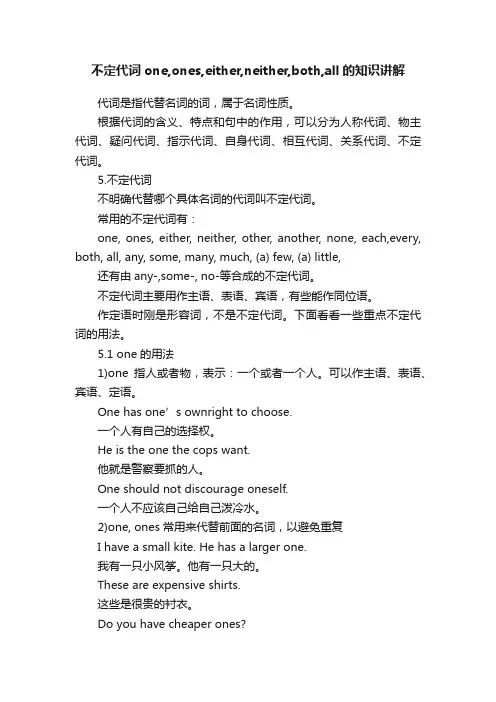
不定代词one,ones,either,neither,both,all的知识讲解代词是指代替名词的词,属于名词性质。
根据代词的含义、特点和句中的作用,可以分为人称代词、物主代词、疑问代词、指示代词、自身代词、相互代词、关系代词、不定代词。
5.不定代词不明确代替哪个具体名词的代词叫不定代词。
常用的不定代词有:one, ones, either, neither, other, another, none, each,every, both, all, any, some, many, much, (a) few, (a) little,还有由any-,some-, no-等合成的不定代词。
不定代词主要用作主语、表语、宾语,有些能作同位语。
作定语时刚是形容词,不是不定代词。
下面看看一些重点不定代词的用法。
5.1 one的用法1)one指人或者物,表示:一个或者一个人。
可以作主语、表语、宾语、定语。
On e has one’s ownright to choose.一个人有自己的选择权。
He is the one the cops want.他就是警察要抓的人。
One should not discourage oneself.一个人不应该自己给自己泼冷水。
2)one, ones常用来代替前面的名词,以避免重复I have a small kite. He has a larger one.我有一只小风筝。
他有一只大的。
These are expensive shirts.这些是很贵的衬衣。
Do you have cheaper ones?有便宜些的吗?5.2 either, neither,both用法either:两者中的一个(任何一个);neither:两者全否定,一个都没有;both:两者全肯定。
Either is right.哪一个都对。
(作主语)Neither is wrong.两个都没错。
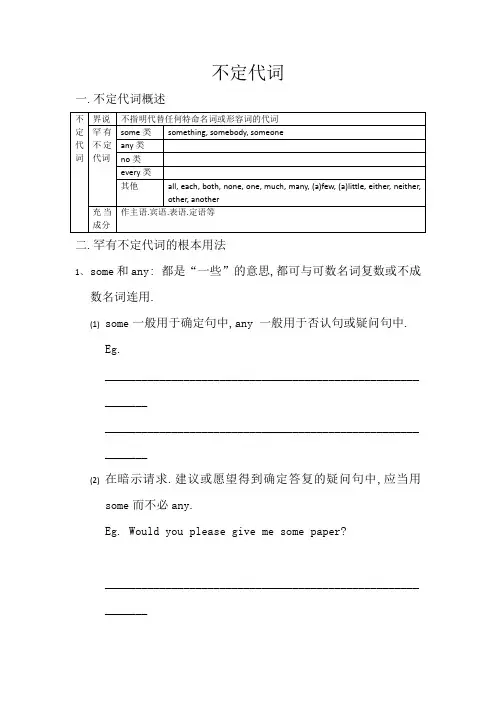
不定代词一.不定代词概述二.罕有不定代词的根本用法1、some和any: 都是“一些”的意思,都可与可数名词复数或不成数名词连用.(1)some一般用于确定句中,any 一般用于否认句或疑问句中.Eg.____________________________________________________ ___________________________________________________________ _______(2)在暗示请求.建议或愿望得到确定答复的疑问句中,应当用some而不必any.Eg. Would you please give me some paper?____________________________________________________ _______(3)当any 暗示“任何”或“无论哪一个”的意义时,可以用于确定句,此时any要重读.Eg. You may come at any time that is convenient to you.___________________________________________________________2、暗示数目的不定代词(1)many______, few_______, a few_______, 用以代替或润饰可数名词.(2)much______, little_______, a little________,用以代替或润饰不成数名词.(3)_______和_______暗示确定意义,_______和_______暗示否认意义.(4)a lot of 和plenty of 等短语既可以润饰可数名词,又可以润饰不成数名词.3.暗示两者和三者的不定代词(1)暗示两者: both, either, neither(2)暗示三者: all, any, none, every(3)暗示确定:both, all(4)暗示否认:none, neither练一练:用以上不定代词填空.我的怙恃都是大夫.__________________________________街道的双方都种了树.There are trees on ______ sides of the street.= There are trees on ______ side of the street.他有两个儿子,都不富有.He has two sons. ______ of them is rich.他有三个儿子,都不富有.He has three sons. ______ of them is rich.三.复合不定代词的用法(1)复合不定代词somebody ,something ,anything,nothing ,everything, everybody等是由some , any ,no ,every, 加上body, thing 组成的,叫做复合不定代词,在句子中当单数应用.(2)somebody, something, someone 一般用于确定句中;anything, anybody,anyone一般用于疑问句和否认句中.(3)假如要在疑问句中暗示请求.建议等确定的意思或者愿望得到确定的答复时,用somebody, someone 或something.(4)润饰复合不定代词的形容词或不定式应放在它们的后面.Eg. He has nothing much to do today.他今天没有若干工作做.Lucy hasn’t anything important to do. 露西没有任何主要时做.四.疑难拓展1.few/a few/little/a little(1)后接名词的不合._______和_______后接可数名词复数,_______和_______后接不成数名词.Eg. There are _______ new words in the text. 课文中有一些新单词.Can you speak _______ English? 你能说一点英语吗?(2)暗示确定意义和否认意义的差别._______和________ 暗示确定,______和_______暗示否认.Eg. I have ________ friends there. I often play with them. There is _______ meat at home. Let’s buy some.2.other/others/the other/another(1)other暗示“另一个”的意思,在句中可作主语.宾语或定语,不自力应用,平日润饰可数名词复数.(2)others可自力应用,无规模限制.(3)other和others前面加定冠词the 时暗示特指,不加the 暗示泛指.The other暗示两个中的另一个,经常应用于句型”one…the other…”,the others 暗示全体其余的人或物.Eg. I have two brothers. ____ is a doctor; ________ is a teacher.He is always ready to help _______.Five of them are in the classroom. What about _______?(4)another(别的一个,又一个),只能代替或润饰单数名词,可用作主语.宾语或定语,不自力应用.前面不加冠词.Eg. Don’t lose heart. Have another try.(5)Another 后可以跟few 或带数字的复数名词.Eg. Just think what our town will be like in another few years.You’d better stay in bed for another two weeks.3、部分否认及完整否认Not与不定代词all, both, every等暗示全体意义的词连用时组成部分否认;若要暗示完整否认,则须要换用none, neither, no 等.练一练:翻译下列句子.4、all, both, each等用作同位语若用作主语同位语,主语可所以名词或代词;若用作宾语等其他成分的同位语,则宾语等成分必须是人称代词,而不克不实时名词.Eg. We all have read it.(all润饰的主语是代词)The village all have been destroyed.(all润饰的主语是名词)They told us all to wait here.(all 润饰的宾语是代词) 5、one 和it 的差别应用(1)it 指代前面的某物.Eg. Where is my pen? I can’t find it.(it 指代前面提到的那支笔)(2)one可以指人,也可以指物.用来代替上文中提到的单数可数名词以及防止反复,其复数情势为ones.Eg. Your pen is so nice. I want to buy one like this.教室练习训练一、单选.1.The two fishermen saw_______ in the sky while they werefishing by a river.A. something strangeB.anything strangeC. strange somethingD. strange anything2. --- Is ____ here? ---No. Bob and Tim have asked for leave.A.anybodyB. somebodyC. everybodyD. nobody3.---Do you want tea or coffee? ---______.I really don't mind4.The old man has two sons .One is a soldier, _______ is a worker.5. There are shops on _____ side of the street.________ of them do not close till 12 at night.A. both; AllB. every; NoneC. either; SomeD. other; Many6. There is not ___ meat in my bowl. There is ____ chicken in it.A. some; anyB. any; someC. any; anyD. some; some7. Could you do___for me, please?A.everythingB. nothingC. somethingD. anything8. Sorry, I can't answer your question. I know____ about the subject.A. a littleB. littleC. fewD. a few9. ---Which would you like, a cup of tea or a glass of milk?----____, thanks. I think I'll just have a glass of water.A. NoneB. NeitherC. BothD. Either10. Tom shook his head and said to us there was _____ in the classroom.A. anybodyB. nobodyC. somebodyD. everybody11. Could I have _____ bottle of apple juice, please?A. anotherB. otherC. some moreD. second12. There are 25 techers in this grade. Eight of them are womenteachers and ______ are men teachers.A. the otherB. the othersC. othersD. other13. They were all tired, but _____of them took a rest.14. ---We have red and yellow T-shirts. Which colour do youlike?--- I’m afraid ____. I think blue will be OK.A. bothB. eitherC. neitherD. none15. ---Can I come this afternoon o tomorrow morning?---_____ is OK. I’m free today and tomorrow.A. EitherB. NeitherC. BothD. None二.按请求完成句子.1. Both Tom and Tim are good at sports.(改为否认句)______ Tom _____ Tim ______ good at sports.2. I can’t speak much English.(同义句转化)I _____ speak_____ English.3. There is something wrong with his eyes.(改为一般疑问句) ______ ______ _______ wrong with his eyes?4. This answer is right. That answer is also right(同义句转化)______ this answer ______ that one are right.5. They haven’t visited the village.She hasn’t visited thevillage either.(连成一句)___________________________________________三.下列句子中各有一处错误,请找出并纠正.1.It is very difficult, and a few people understand it.______________2.Too many work has to be done. ______________3.Why not buy any bread? ______________4.Anyone know how to do it. ______________5.There is not nothing wrong with the radio. ______________家庭功课一、单选.1.The teacher asked the boy many questions, but he only ansewered ______ of them.A.someB. lotsC. eachD. few2. ---I need something for cutting the paper. ---Oh, you want a knife? OK, I’ll get ___ for you.3.Two places of inteerest in Beijing are well known to people from home and abroad. One is the Great Wall, and _____ is the Summer Palace.A. the otherB. anotherC. otherD. others4. ---Would you like _____ to drink? ---Yes. I’d like a cup of coffee.A. something elseB. else somethingC. anything elseD. else anything5. Maybe the disaster can destroy our homes, but ______ can destroy the love in our people.A. somethingB. everythingC. anythingD. nothing二.改错.2. There are many trees on both side of the road. ___________3. He has three sons, but neither of them lives there. ___________4. All of the storybooks is interesting. ___________5. I have important something to tell you. ___________。
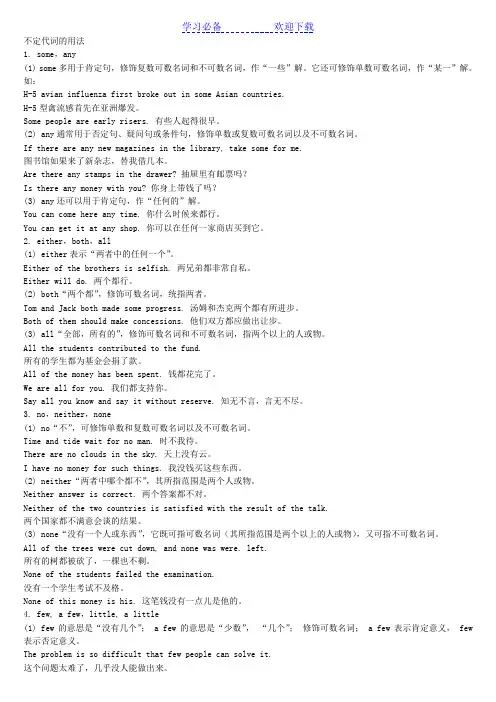
不定代词的用法1. some,any(1) some多用于肯定句,修饰复数可数名词和不可数名词,作“一些”解。
它还可修饰单数可数名词,作“某一”解。
如:H-5 avian influenza first broke out in some Asian countries.H-5型禽流感首先在亚洲爆发。
Some people are early risers. 有些人起得很早。
(2) any通常用于否定句、疑问句或条件句,修饰单数或复数可数名词以及不可数名词。
If there are any new magazines in the library, take some for me.图书馆如果来了新杂志,替我借几本。
Are there any stamps in the drawer? 抽屉里有邮票吗?Is there any money with you? 你身上带钱了吗?(3) any还可以用于肯定句,作“任何的”解。
You can come here any time. 你什么时候来都行。
You can get it at any shop. 你可以在任何一家商店买到它。
2. either,both,all(1) either表示“两者中的任何一个”。
Either of the brothers is selfish. 两兄弟都非常自私。
Either will do. 两个都行。
(2) both“两个都”,修饰可数名词,统指两者。
Tom and Jack both made some progress. 汤姆和杰克两个都有所进步。
Both of them should make concessions. 他们双方都应做出让步。
(3) all“全部,所有的”,修饰可数名词和不可数名词,指两个以上的人或物。
All the students contributed to the fund.所有的学生都为基金会捐了款。
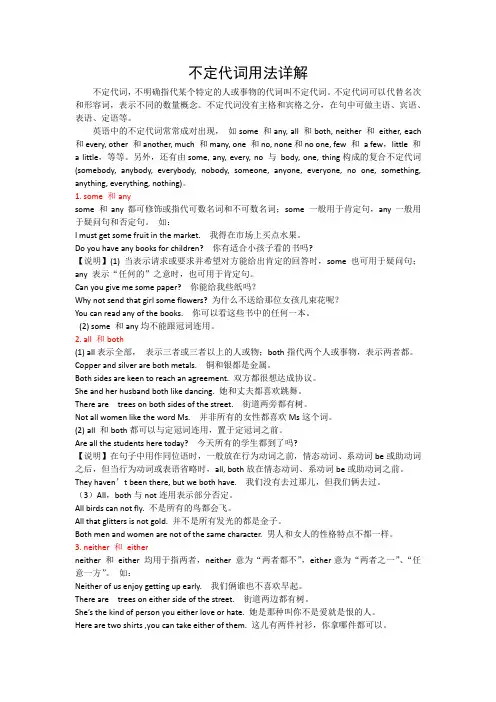
不定代词用法详解不定代词,不明确指代某个特定的人或事物的代词叫不定代词。
不定代词可以代替名次和形容词,表示不同的数量概念。
不定代词没有主格和宾格之分,在句中可做主语、宾语、表语、定语等。
英语中的不定代词常常成对出现,如some 和any, all 和both, neither 和either, each 和every, other 和another, much 和many, one 和no, none和no one, few 和 a few,little 和a little,等等。
另外,还有由some, any, every, no 与body, one, thing构成的复合不定代词(somebody, anybody, everybody, nobody, someone, anyone, everyone, no one, something, anything, everything, nothing)。
1. some 和anysome 和any都可修饰或指代可数名词和不可数名词;some 一般用于肯定句,any一般用于疑问句和否定句。
如:I must get some fruit in the market. 我得在市场上买点水果。
Do you have any books for children? 你有适合小孩子看的书吗?【说明】(1) 当表示请求或要求并希望对方能给出肯定的回答时,some 也可用于疑问句;any 表示“任何的”之意时,也可用于肯定句。
Can you give me some paper? 你能给我些纸吗?Why not send that girl some flowers? 为什么不送给那位女孩几束花呢?You can read any of the books. 你可以看这些书中的任何一本。
(2) some 和any均不能跟冠词连用。
2. all 和both(1) all表示全部,表示三者或三者以上的人或物;both指代两个人或事物,表示两者都。
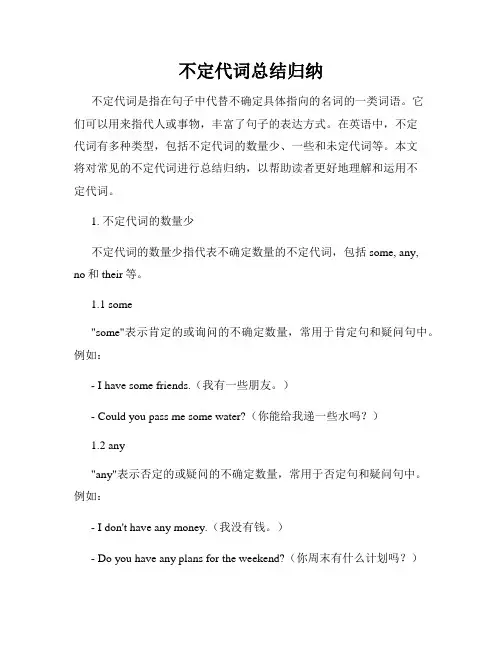
不定代词总结归纳不定代词是指在句子中代替不确定具体指向的名词的一类词语。
它们可以用来指代人或事物,丰富了句子的表达方式。
在英语中,不定代词有多种类型,包括不定代词的数量少、一些和未定代词等。
本文将对常见的不定代词进行总结归纳,以帮助读者更好地理解和运用不定代词。
1. 不定代词的数量少不定代词的数量少指代表不确定数量的不定代词,包括some, any,no和their等。
1.1 some"some"表示肯定的或询问的不确定数量,常用于肯定句和疑问句中。
例如:- I have some friends.(我有一些朋友。
)- Could you pass me some water?(你能给我递一些水吗?)1.2 any"any"表示否定的或疑问的不确定数量,常用于否定句和疑问句中。
例如:- I don't have any money.(我没有钱。
)- Do you have any plans for the weekend?(你周末有什么计划吗?)1.3 no"no"表示零个或否定的数量,常用于否定句和问句中。
例如:- There is no milk in the fridge.(冰箱里没有牛奶。
)- Did you see no one else in the room?(你看到房间里没有别人吗?)1.4 their"their"表示"他们/她们/它们的",常用于指代复数名词的所有格。
例如:- The students are studying for their exams.(学生们正在为他们的考试而学习。
)2. 一些一些不定代词用于表示某个不确定数量的人或物,包括:somebody/someone, anybody/anyone和nobody/no one等。
2.1 somebody/someone"somebody"和"someone"表示"某人",用于肯定句中。
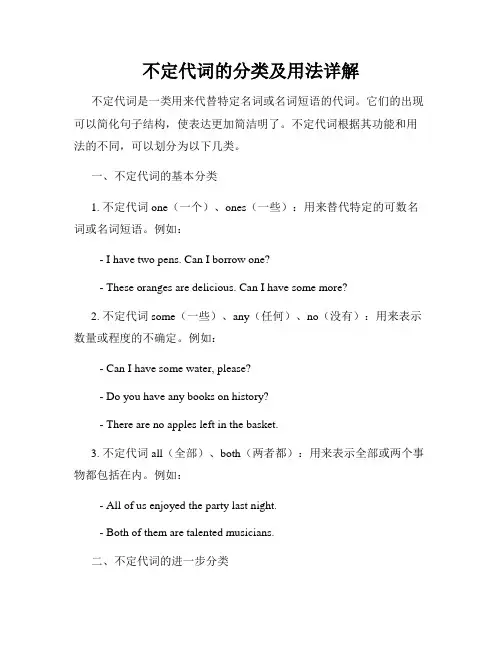
不定代词的分类及用法详解不定代词是一类用来代替特定名词或名词短语的代词。
它们的出现可以简化句子结构,使表达更加简洁明了。
不定代词根据其功能和用法的不同,可以划分为以下几类。
一、不定代词的基本分类1. 不定代词one(一个)、ones(一些):用来替代特定的可数名词或名词短语。
例如:- I have two pens. Can I borrow one?- These oranges are delicious. Can I have some more?2. 不定代词some(一些)、any(任何)、no(没有):用来表示数量或程度的不确定。
例如:- Can I have some water, please?- Do you have any books on history?- There are no apples left in the basket.3. 不定代词all(全部)、both(两者都):用来表示全部或两个事物都包括在内。
例如:- All of us enjoyed the party last night.- Both of them are talented musicians.二、不定代词的进一步分类1. 不定代词some与any的应用- some和any均可用于肯定句、疑问句和否定句中,但有一定区别。
例如:- Would you like some tea?(肯定句)- Would you like any tea?(疑问句,含有否定意义)- I don't have any tea.(否定句)2. 不定代词some与any在可数名词和不可数名词前的用法- some用于肯定句,表示肯定的数量或程度。
例如:- There are some books on the shelf.- I need some water to drink.- any用于疑问句和否定句,表示不确定的数量或程度。
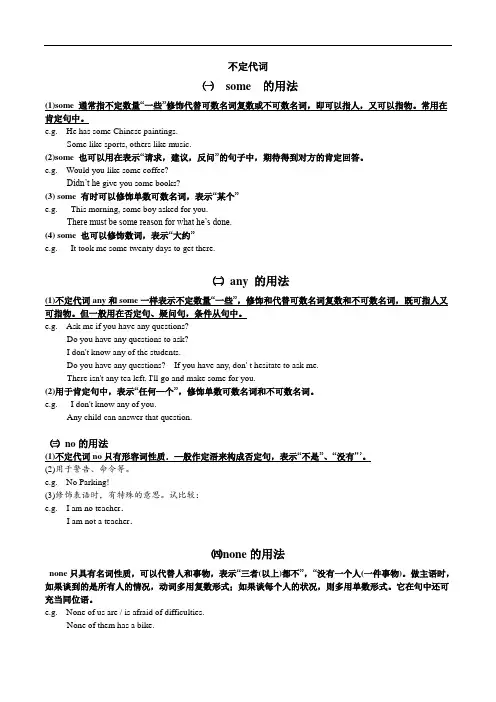
不定代词㈠some 的用法(1)some 通常指不定数量“一些”修饰代替可数名词复数或不可数名词,即可以指人,又可以指物。
常用在肯定句中。
e.g. He has some Chinese paintings.Some like sports, others like music.(2)some 也可以用在表示“请求,建议,反问”的句子中,期待得到对方的肯定回答。
e.g. Would you like some coffee?Didn’t he give you some books?(3) some 有时可以修饰单数可数名词,表示“某个”e.g. This morning, some boy asked for you.There must be some reason for what he’s done.(4) some 也可以修饰数词,表示“大约”e.g. It took me some twenty days to get there.㈡any 的用法(1)不定代词any和some一样表示不定数量“一些”,修饰和代替可数名词复数和不可数名词,既可指人又可指物。
但一般用在否定句、疑问句,条件从句中。
e.g. Ask me if you have any questions?Do you have any questions to ask?I don't know any of the students.Do you have any questions? If you have any, don' t hesitate to ask me.There isn't any tea left. I'll go and make some for you.(2)用于肯定句中,表示“任何—个”,修饰单数可数名词和不可数名词。
e.g. I don't know any of you.Any child can answer that question.㈢no的用法(1)不定代词no只有形容词性质.—般作定浯来构成否定句,表示“不是”、“没有"’。
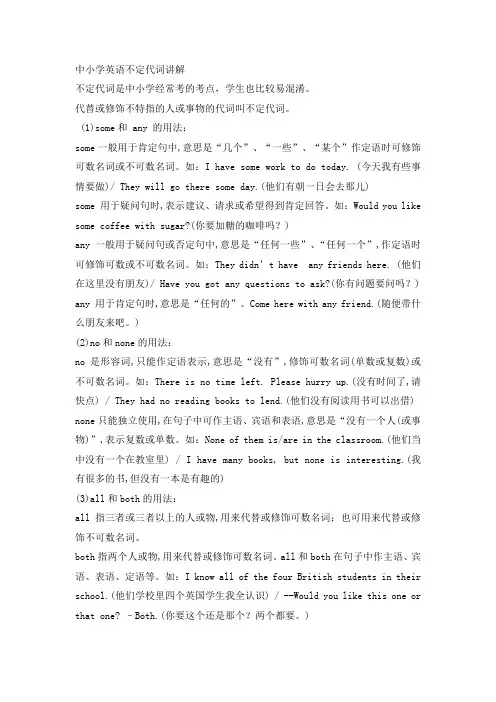
中小学英语不定代词讲解不定代词是中小学经常考的考点,学生也比较易混淆。
代替或修饰不特指的人或事物的代词叫不定代词。
(1)some和 any 的用法:some一般用于肯定句中,意思是“几个”、“一些”、“某个”作定语时可修饰可数名词或不可数名词。
如:I have some work to do today. (今天我有些事情要做)/ They will go there some day.(他们有朝一日会去那儿)some 用于疑问句时,表示建议、请求或希望得到肯定回答。
如:Would you like some coffee with sugar?(你要加糖的咖啡吗?)any 一般用于疑问句或否定句中,意思是“任何一些”、“任何一个”,作定语时可修饰可数或不可数名词。
如:They didn’t have any friends here. (他们在这里没有朋友)/ Have you got any questions to ask?(你有问题要问吗?) any 用于肯定句时,意思是“任何的”。
Come here with any friend.(随便带什么朋友来吧。
)(2)no和none的用法:no是形容词,只能作定语表示,意思是“没有”,修饰可数名词(单数或复数)或不可数名词。
如:There is no time left. Please hurry up.(没有时间了,请快点) / They had no reading books to lend.(他们没有阅读用书可以出借) none只能独立使用,在句子中可作主语、宾语和表语,意思是“没有一个人(或事物)”,表示复数或单数。
如:None of them is/are in the classroom.(他们当中没有一个在教室里) / I have many books, but none is interesting.(我有很多的书,但没有一本是有趣的)(3)all和both的用法:all指三者或三者以上的人或物,用来代替或修饰可数名词;也可用来代替或修饰不可数名词。
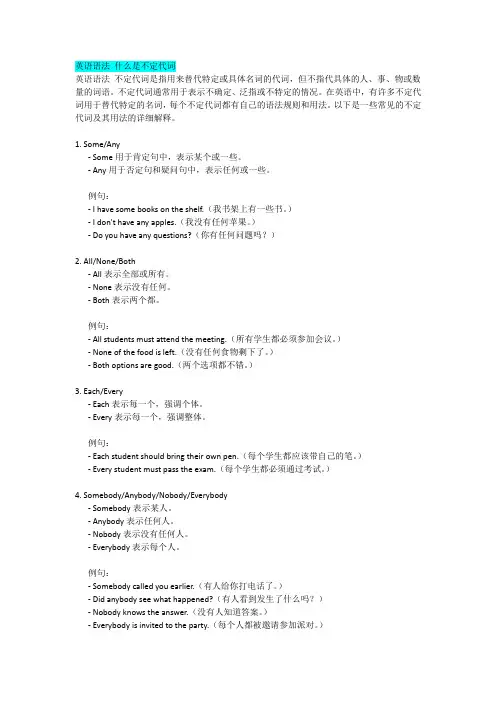
英语语法什么是不定代词英语语法不定代词是指用来替代特定或具体名词的代词,但不指代具体的人、事、物或数量的词语。
不定代词通常用于表示不确定、泛指或不特定的情况。
在英语中,有许多不定代词用于替代特定的名词,每个不定代词都有自己的语法规则和用法。
以下是一些常见的不定代词及其用法的详细解释。
1. Some/Any- Some用于肯定句中,表示某个或一些。
- Any用于否定句和疑问句中,表示任何或一些。
例句:- I have some books on the shelf.(我书架上有一些书。
)- I don't have any apples.(我没有任何苹果。
)- Do you have any questions?(你有任何问题吗?)2. All/None/Both- All表示全部或所有。
- None表示没有任何。
- Both表示两个都。
例句:- All students must attend the meeting.(所有学生都必须参加会议。
)- None of the food is left.(没有任何食物剩下了。
)- Both options are good.(两个选项都不错。
)3. Each/Every- Each表示每一个,强调个体。
- Every表示每一个,强调整体。
例句:- Each student should bring their own pen.(每个学生都应该带自己的笔。
)- Every student must pass the exam.(每个学生都必须通过考试。
)4. Somebody/Anybody/Nobody/Everybody- Somebody表示某人。
- Anybody表示任何人。
- Nobody表示没有任何人。
- Everybody表示每个人。
例句:- Somebody called you earlier.(有人给你打电话了。
)- Did anybody see what happened?(有人看到发生了什么吗?)- Nobody knows the answer.(没有人知道答案。
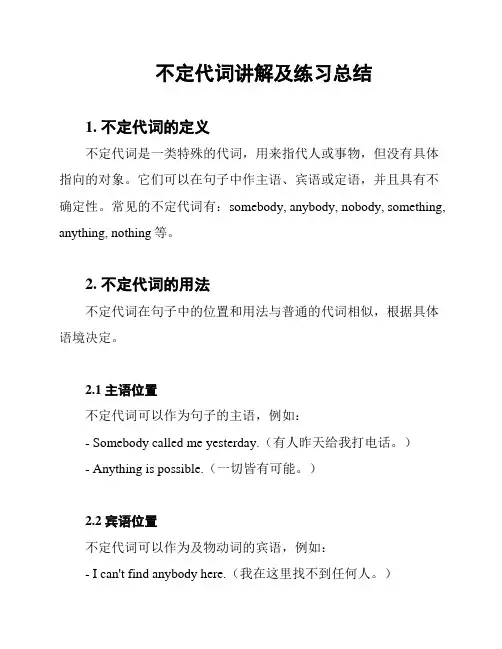
不定代词讲解及练习总结1. 不定代词的定义不定代词是一类特殊的代词,用来指代人或事物,但没有具体指向的对象。
它们可以在句子中作主语、宾语或定语,并且具有不确定性。
常见的不定代词有:somebody, anybody, nobody, something, anything, nothing等。
2. 不定代词的用法不定代词在句子中的位置和用法与普通的代词相似,根据具体语境决定。
2.1 主语位置不定代词可以作为句子的主语,例如:- Somebody called me yesterday.(有人昨天给我打电话。
)- Anything is possible.(一切皆有可能。
)2.2 宾语位置不定代词可以作为及物动词的宾语,例如:- I can't find anybody here.(我在这里找不到任何人。
)- Have you seen something strange?(你见过什么奇怪的东西吗?)2.3 定语位置不定代词可以用作名词的修饰语,例如:- Is there anything important in the letter?(信中有重要的东西吗?)- I need somebody reliable to help me.(我需要一个可靠的人来帮助我。
)3. 不定代词的练为了更好地掌握不定代词的用法,以下是一些练题:3.1 单项选择题a) Everybodyb) Nobodyc) Anybody2. I don't have ____ to wear to the party.a) somethingb) anythingc) nothing3. ____ is waiting for you outside.a) Somebodyb) Anybodyc) Nobody3.2 句子改写题将以下句子改写成含有不定代词的句子:1. We have a lot of books.(改写成含不定代词的句子)2. The teacher needs a volunteer.(改写成含不定代词的句子)4. 总结不定代词在英语中起着重要的作用,它们可以用来指代不确定的人或事物,并且可以在句子中的不同位置使用。
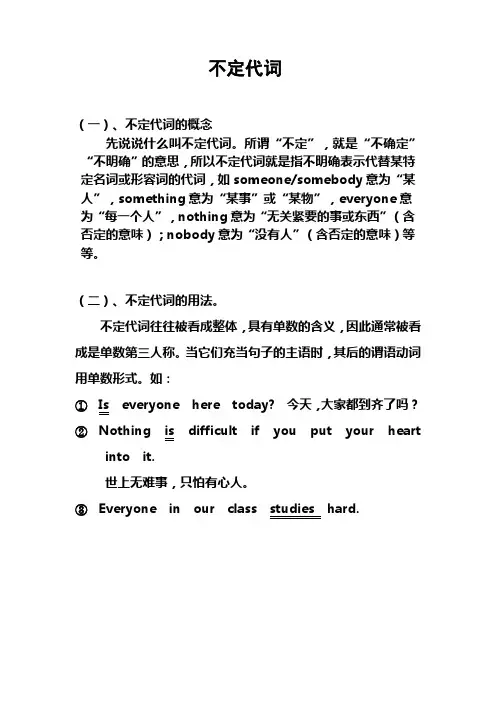
不定代词
(一)、不定代词的概念
先说说什么叫不定代词。
所谓“不定”,就是“不确定”“不明确”的意思,所以不定代词就是指不明确表示代替某特定名词或形容词的代词,如someone/somebody意为“某人”,something意为“某事”或“某物”,everyone意为“每一个人”,nothing意为“无关紧要的事或东西”(含否定的意味);nobody意为“没有人”(含否定的意味)等等。
(二)、不定代词的用法。
不定代词往往被看成整体,具有单数的含义,因此通常被看成是单数第三人称。
当它们充当句子的主语时,其后的谓语动词用单数形式。
如:
① Is everyone here today? 今天,大家都到齐了吗?
② Nothing is difficult if you put your heart
into it.
世上无难事,只怕有心人。
③ Everyone in our class studies hard.。
英语不定代词的简单用法英语不定代词的简单用法导语:不定代词即不指明代替任何特定名词或形容词的代词。
下面YJBYS店铺讲解不定代词的用法,欢迎参考!1. 不定代词概说先说说什么叫不定代词。
所谓“不定”,就是“不确定”“不明确”的意思,所以不定代词就是指不明确表示代替某特定名词或形容词的代词,如someone意为“某人”,something意为“某事”或“某物”,many表示“许多人”或“许多物”,a few表示“几个人”或“几个事物”,等等。
英语的不定代词很多,如some, any, all, each, both, either, neither, one, none, many, much, other, another, no, (a) few, (a) little, enough, every 等,以及由 some, any, no 和 every 构成的复合不定代词(如somebody, anyone, nothing 等)。
2. some与any一般说来,some 用于肯定句中,any 用于否定句、疑问句和条件句中。
如:肯定句:He asked some questions. 他问了一些问题。
否定句:He didn’t ask any questions. 他没有问任何问题。
疑问句:Did he ask any questions? 他问了些问题没有?但是,在表示请求、邀请或征求意见的句子中,通常要用some 而不用any。
如:Shall I get some for you? 要我帮你拿些来吗?Since you have plenty of them, why not give her some? 既然你有那么多,为什么不给她一些呢?any 有时也用于肯定句中,表示“任何”的意思。
如:Any of these may suit you. 这些中间的任何一个都可能适合你。
另外,还有一点要特别注意,汉语可说“任何……都不”,但英语不能说any…not。
不定代词一、概念不指明代替任何特定对象的代词叫不定代词。
二、句法功能不定代词大都可以代替名词和形容词,在句中做主语,宾语,表语,定语,同位语。
有些不定代词有所有格:如:one’s, others’ 等;以body , one结尾的不定代词均可加’s 构成所有格,如:somebody’s ,everyone’s 等。
Both (of us ) are right . (做主语)If you have any ,give us some .(做宾语)I’m not somebody , I’m nobody .(做表语)You may take either road .(做定语)Everybody’s business is nobody’s business.(做定语)They both agree to stay here .(做同位语)三、常用不定代词的用法1、some 和any① some一般用于肯定句,意思是“一些”,“某个”,做定语时可修饰可数名词或不可数名词。
②some 用于疑问句时,表建议,请求或希望得到肯定回答。
③any用于一般疑问句或否定句,意思是“任何一些”,“任何一个”做定语时可修饰可数名词或不可数名词。
④any 用于肯定句,意思是“任何的”。
2、no 和none① no是形容词只能做定语,意思是“没有”,修饰名词。
② none 指三个或三个以上的人或物中:“没有一个”,或不可数名词中“没有一点”。
相当于not one , not any ,在句中做主语,宾语。
可独立使用,其后也可接of 短语。
3、all 和both 的用法① all指三者或三者以上的人或物,用来修饰或代替可数名词复数或不可数名词。
both 指两个人和或物,用来用来修饰或代替可数名词复数。
all 和both 在句中做主语、宾语、表语、定语等。
② all和both 既可修饰名词,采用“all/both+(the )+名词”的形式,也可独立使用,采用“all/ both +of the +名词”的形式。
英语词汇小知识不定代词详解不定代词是代词种类中相对复杂的一种,数量较多且很多词意思几乎相同但修饰不同类型的名词,因此学习者们很容易混淆使用,犯低级错误导致不必要的丢分。
不定代词在各类考试中都是考查的重点,所以这次就为大家带来不定代词的讲解,希望能给各位学习者们提供帮助。
1.定义:不定代词是不指明代替任何特定名词或形容词的代词。
2.种类:英语中不定代词数量非常多some(something,somebody,someone,somewhere)any(anything,anybody,anyone,anywhere)no(nothing,nobody,no one)every(everything,everybody,everyone,everywhere)all,each,both,much,many,(a)little(a)few,other(s),another,none,one,either,neitherand so on.3.用法比拟:① some和any:两者都是“一些”的意思,都可和可数名词或不可数名词连用。
some一般用于肯定句中或表示请求意义的疑问句;而any那么用于否认句、疑问句或条件从句中.eg.Tom has some picture booksHave you any questions?Why don’t you bring some flowers?② few 与 little:few和a few 后接复数名词,而little和a little后接不可数名词。
few 和 little表示数量很少或几乎没有,强调“少”,含有否认意义,a few 和 a little 那么表示数量虽然少但毕竟还有,强调“有”,含有肯定意义。
eg.He knew few of them.I have only a few of pens.He knew little about it.There is still a little water in the bottle.③ all, every, each:all 强调整体地考虑总体,every 强调考虑总体中的所有成员(与all很接近,但all通常与复数名词搭配,every通常与单数名词搭配),each那么强调逐个逐个地考虑总体,all和each既可单独使用,也可后接名词,还可后接of短语,而every 后必须接名词,既不能单独使用也不能后接 of 短语,each 指两者或两者以上的“每个”,every指三者或三者以上“每个”。
不定代词讲解与习题 .不定代词讲解与习题 .不定代词用法注意点:1. one, some与any:1) one可以泛指任何人,也可特指,复数为ones。
a. one作为代词可以指人,也可以指物。
b. one,ones (one的复数形式) 可用来代替前面出现过的少数名词,以避免重复。
c. one的前面可用this,that,the,which等词来修饰。
d. 常有a+形容词+one这一形式。
it和one的用法区别:it用来指特定的东西,而one则用于替代不特定的东西some多用于肯定句,any多用于疑问句和否定句。
One should learn to think of others.Have you any bookmarks no, i don’t have any bookmarks.I have some questions to ask.2) some可用于疑问句中,表示盼望得到肯定的答复,或者表示建议,请求等。
would you like some bananas could you give me some money3) some 和any修饰可数名词单数时,some表示某个,any表示任何一个。
i have read this article in some magazine. please correct the mistakes, ifany.4) some和数词连用表示“大约”,any可与比较级连用表示程度。
there are some 3,000 students in this school. do you feel any better toda y2. each和every:a. each用来指两个或两个以上的人或物中的一个。
every则指两个以上的人或物中的一个。
b. 从含义和语法功能上看,each是“单个”的意思,侧重个体,在句中可作主语、同位语、定语和宾语。
而every是“每一个”之意,侧重全体、整体、共性。
在句中只能作定语,也就是说它后面必须跟着名词。
而由every构成的合成词后面绝不能跟名词。
each强调个别,代表的数可以是两个或两个以上,而every强调整体,所指的数必须是三个或三个以上。
each student has a pocket dictionary. / each (of us) has a dictionary. / we e ach have a dictionary.every student has strong and weak points. / every one of us has strong and we ak points.3. none和no:no等于not any,作定语。
none作主语或宾语,代替不可数名词,谓语用单数,代替可数名词,谓语单复数皆可以。
there is no water in the bottle.how much water is there in the bottle none.none of the students are (is) afraid of difficulties.4. other和another:a. another=another"另一个”,泛指众多者中的另一个,在原有基础上自然增加的另一个。
一般后面接单数名词,前面不能加定冠词。
有时another可以用在复数名词前表示“又”“再”,如:i want to have another two cakes.我想再吃两个蛋糕。
b.the other表示两个中的另一个,常与one连用。
常见形式是“one...the other...”。
c. other+复数名词=othersd. the other+复数名词=the others1) other泛指“另外的,别的”常与其他词连用,如:the other day, every other week, some other reason, no other way,the other特指两者中的另外一个,复数为the others。
如:he held a book in one hand and his notes in the other.two students in our class failed, but all the others passed the exam.2) another指“又一个,另一个”无所指,复数形式是others,泛指“别的人或事”如:i don’t like this shirt, please show me another (one).the trousers are too long, please give me another pair / some others.some like football, while others like basketball.5. all和both, neither和either两者三者都both all都不neither none任何either any在…之间between amongboth表示“两者都……”,而a11表示“三个或三个以上的人或物都……”。
a11、both在句中放在be动词,情态动词及助动词之后,放在实义动词之前。
either:指两者中的任意一个。
作主语谓语用单数。
neither:指两者都不,全否定。
作主语谓语用单数。
both:指两者都。
作主语谓语用复数。
all表示不可数名词时,其谓语动词用单数。
both和all加否定词表示部分否定,全部否定用neither和none.all of the books are not written in english. / not all of the books are written in english. both of us are not teachers. / not both of us are teach ers. / either of us is a teacher.6. many和muchmany只能和复数可数名词连用。
much注意:a lot of/lots of / plenty of=much/manya large/great number of=manya great/good deal of=much7. a few,little,a littlefew,little表示否定含义,“很少”“几乎没有”;a few,a little表示肯定含义,有一些”。
few,a few用在可数名词前,little,a little用在不可数名词前。
只能和不可数名词连用。
!注意:人称排列:单数排列顺序为:你,他/ 她,我you , he/ she and i复数排列顺序为:你们,我们,他们may come to my house ____ this week ____ next week.A .neither; orB .from; toC .either;or D. either; nordon't think we can do it all ____.A. by ourselvesB. by myselfC. by ourself D .by yourselvesdon't want this shirt. Please show me ____.A .othersB .the othersC .anotherD .the othercan't repair the model ship ____. Can you help ?A .me; me B. myself ;myself C .myself ;me D. me ; myself your brother often wash clothes ?A. he B .himself C. herself D .him6. We study Chinese, English , maths and some subjects.A .the other B. one C .other D .anotherhave two sisters. of them are doctors.A. BothB. All C .Either D. Neitherbook on the shelf is . She wrote name on its cover .A .Hers; her ;herself B. Her; hers; herselfC. Herself; her; hers D .Her; herself; herself9. "Don't worry . There's much wrong with you." said the doctor.A. nothing B .everything C. something D .veryshoes are too small. You may buy some ____ shoes.A .anotherB .otherC .the .others D. othersasked Jim and Bob to come to my house for dinner , but ____ of them came .A .another B. other C .the others D .othersare ____ the same size , so you may take ____ half of the cake.A. at; eachB. in; both C .at; neither D .in; eitherand John have come back , but ____ students in the class aren't here yet.A. the other B others C. another D. the othersmother is kindness ____.A .itself B. herself D .himselfstayed there longer than ____.A. anyone B .anything else C. anybody D .anybody elsethis her bike No, it isn't . It's ____.A. mineB. myC. meD. he's17. ____ Li Ping's brother.A. HerB. HisC. He'sD. She'sis a boy. name is Wang Bing.A. HeB. HisC. HerD. He's's this .A. It's a breadB. It is a breadC. It's breadD. This's breadbowls are on the table .There are some eggs in .A. theB. themC. itD. hehave a meeting .A. me B. you C. us D. me22. Mother often sees on Sunday .A. her all friendsB. all her friendC. her friendsD. her all friend.you see Tom and his sister , tell that mother is waiting at the gate.A. his ;hisB. her; hersC. them ; theirD. his ; herwants you to talk about China.A .anythingB .nothing C. thing D .somethingseems ill . Are you sure it's ?A .nothing serious B. anything seriousC. serious nothingD. serious anything1. — Here is a schoolbag. Whose is it — Oh, it's_________. Thank you.A. myB. mineC. me2. — Here is a schoolbag. Whose is it — Oh, it's_________. Thank you.A. myB. mineC. me3. Mrs. Brown is nice. Every day she tried to cook__________for me during my stay in Canada.A. something differentB. anything differentC. noting different4. Mrs. Brown is nice. Every day she tried to cook__________for me during my stay in Canada.A. something differentB. anything differentC. noting different5. --- How is Helen in the new school--- She is doing very well. There is ______ to worry about.A.SomethingB. anythingC. nothingD. everything6. --We have red and yellow T-shirts. Which color do you like-- I'm afraid______. 1 think blue will be OK.A. bothB. eitherC. neitherD. none。